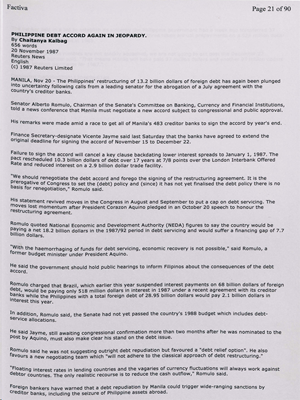PHILIPPINE DEBT ACCORD AGAIN IN JEOPARDY
[Reuters]
Published date: 20th Nov 1987
20 November 1987
Reuters News
English
(c) 1987 Reuters Limited
MANILA, Nov 20 – The Philippines’ restructuring of 13.2 billion dollars of foreign debt has again been plunged into uncertainty following calls from a leading senator for the abrogation of a July agreement with the country’s creditor banks.
Senator Alberto Romulo, Chairman of the Senate’s Committee on Banking, Currency and Financial Institutions, told a news conference that Manila must negotiate a new accord subject to congressional and public approval.
His remarks were made amid a race to get all of Manila’s 483 creditor banks to sign the accord by year’s end.
Finance Secretary-designate Vicente Jayme said last Saturday that the banks have agreed to extend the original deadline for signing the accord of November 15 to December 22.
Failure to sign the accord will cancel a key clause backdating lower interest spreads to January 1, 1987. The pact rescheduled 10.3 billion dollars of debt over 17 years at 7/8 points over the London Interbank Offered Rate and reduced interest on a 2.9 billion dollar trade facility.
“We should renegotiate the debt accord and forego the signing of the restructuring agreement. It is the prerogative of Congress to set the (debt) policy and (since) it has not yet finalised the debt policy there is no basis for renegotiation,” Romulo said,
His statement revived moves in the Congress in August and September to put a cap on debt servicing. The moves lost momentum after President Corazon Aquino pledged in an October 20 speech to honour the restructuring agreement.
Romulo quoted National Economic and Development Authority (NEDA) figures to say the country would be paying a net 18.2 billion dollars in the 1987/92 period in debt servicing and would suffer a financing gap of 7.7 billion dollars.
“With the haemorrhaging of funds for debt servicing, economic recovery is not possible,” said Romulo, a former budget minister under President Aquino.
He said the government should hold public hearings to inform Filipinos about the consequences of the debt accord.
Romulo charged that Brazil, which earlier this year suspended interest payments on 68 billion dollars of foreign debt, would be paying only 518 million dollars in interest in 1987 under a recent agreement with its creditor banks while the Philippines with a total foreign debt of 28.95 billion dollars would pay 2.1 billion dollars in interest this year.
In addition, Romulo said, the Senate had not yet passed the country’s 1988 budget which includes debt-Service allocations.
He said Jayme, still awaiting congressional confirmation more than two months after he was nominated to the post by Aquino, must also make clear his stand on the debt Issue.
Romulo said he was not suggesting outright debt repudiation but favoured a “debt relief option”. He also favours a new negotiating team which “will not adhere to the classical approach of debt restructuring.”
“Floating interest rates in lending countries and the vagaries of currency fluctuations will always work against debtor countries. The only realistic recourse is to reduce the cash outflow,” Romulo said.
Foreign bankers have warned that a debt repudiation by Manila could trigger wide-ranging sanctions by creditor banks, including the seizure of Philippine assets abroad.
A senior foreign banker close to the negotiations told Reuters that Romulo’s remarks would merely discourage five creditor banks that still have to sign the debt accord.
The banker said in a bid to establish its sincerity the Philippine government had a week ago transferred 37 million dollars to its creditors, representing the first of three token annual prepayments on a 925 million dollar new-money loan granted in 1985.
“If the latest Senate rumbles are not quickly squashed, we are not going to get past the December 22 deadline,” the banker said. “That means Manila will have paid 37 million dollars and another 93 million dollars in extra interest payments for 1987.”






